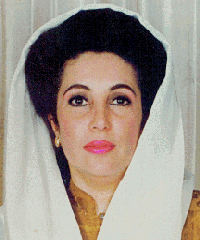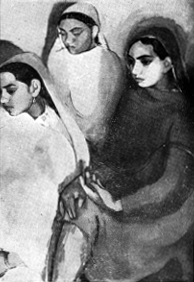|
 |
 |
 |
| Salman Rushdie |
| �� �� �ҡE�| �� �} |
| �D�n�����GNovel |
| ��ƴ��Ѫ̡GKate Liu (�B����) |
|
|
| 1.
Salman Rushdie's
Female Characters
2. Excerpt from The New Empire Within
Britain
|
| |
|
1. Salman Rushdie's Female
Characters
|
|
|
| Women
As Matriarchs
In both The
Moor's Last Sigh and Shame, Rushdie
depicts prominent female characters (Epifania da Gama and Bariamma
Ryder) as the matriarchs of their families. Although this may seem odd
in such a male-dominated society, in southern India matriarchy is
actually a common family organization, and women even own property
jointly with men (Visram 11). Historical records dating back to early
south Indian people frequently include metronyms, perhaps signifying"a
lingering influence of the old Dravidian mother right in an otherwise
patrilineal ordering of society" (Singh 226).
As
Mothers
Due to
Hinduism's strong influence in Indian society, a woman's foremost role
in life is becoming a mother; moreover, her value depends upon her
ability to give birth to sons (Contursi 48). Any power she wields comes
from her ability to procreate, not from her dominance over men
(Contursi 49). An example of this attitude is evidenced in Shame when
Bilqu?s Hyder laments over her inability to produce a male child: "He
wanted a hero of a son; I gave him an idiot female instead . . . I must
accept it: she is my shame" (Rushdie 101).
Rushdie also
toys with the nature of mother-son relationships in Indian and
Pakistani society, emphasizing the perversion of their closeness. In
Shame, for example, the three Shakil mothers dote over their only son
Omar, keeping him"excluded from human society by [their] strange
resolve" (Rushdie 29). Furthermore, the stereotypical mother resents
her son's new wife for monopolizing his affection and tries to disrupt
any opportunities for intimacy in the new marriage (Adler 135). Both
Bariamma's nocturnal segregation of the married couples in Shame
(Rushdie 71) and Flory Zogoiby's demand for Abraham's firstborn son in
The Moor (Rushdie 111) exemplify this unusual attachment.
As
Wives
According to
J.P. Singh in her book The Indian Woman: Myth and Reality,
one of the most notable developments of recent times has been"finding
refuge in the age-old Indian wisdom: for the most part ignore your
husband. Live your life as if he were not there" (305). Arranged
marriages necessitated such sentiment, especially in order to withstand
a husband's physical abuse, cruelty, or apathy. Carmen da Gama, in The
Moor, privately deals with her husband's secret homosexual liaisons, as
does Rani Harappa in the face of Iskander's long absences and sexual
disinterest.
Indian and
Pakistani wives also become part of their husband's family when they
marry; in this arrangement, wives must obey the older women in the
family and comply with all their demands (Adler 135). Living under the
matriarchal rule of Bariamma Ryder, Rushdie writes that Bilqu?s
Ryder"was given more than her fair share of household duties and also
slightly more than her fair share of the rough edge of Bariamma's
tongue" (Moor 73).
As
National Figures
 Politicians
and Painters Politicians
and Painters
As noted in
the book Women and Politics in Islam, which covers
the trial of Benazir Bhutto, the Quranic stand on women leaders is in
staunch opposition: "'A nation that appoints a woman as its ruler shall
never prosper'" says the Bukhari commentary on the Quran (Zakaria 97).
Yet a number of women have attained high political positions in both
Pakistan and India. Benazir
Bhutto,
former Prime Minister of Pakistan, is the model for the character
Arjumand "the Virgin Ironpants" Harappa in Shame. Although Rushdie
portrays her as a woman resentful of her female body-- "it brings a
person nothing but babies, pinches, and shame" (107), Bhutto herself
told Donna Foote of Newsweek it is "'the people who
resent me [that] do so because I am a woman'"(Zakaria 7).
By following
her father Zulfikar Ali Bhutto into political leadership, Benazir and
her literary  counterpart
"the Virgin Ironpants" highlight an interesting trend in South Asia
politics: the family connection. According to Rozina Visram in her book
Women in India and Pakistan, the reason women have been able to
overcome social obstacles and reach high political offices may be
family relationships(54). Both the prime minister of Sri Lanka and
Bangladesh (Sirimavo Bandaranayake and Khaleda Zia, respectively) came
to power after the murders of their husbands, for instance(Visram 55).
In The Moor, Rushdie mentions another woman who followed in the
footsteps of her father: Indira Gandhi, who was prime minister of India
from 1966-77 and 1980-84 before she was assassinated. counterpart
"the Virgin Ironpants" highlight an interesting trend in South Asia
politics: the family connection. According to Rozina Visram in her book
Women in India and Pakistan, the reason women have been able to
overcome social obstacles and reach high political offices may be
family relationships(54). Both the prime minister of Sri Lanka and
Bangladesh (Sirimavo Bandaranayake and Khaleda Zia, respectively) came
to power after the murders of their husbands, for instance(Visram 55).
In The Moor, Rushdie mentions another woman who followed in the
footsteps of her father: Indira Gandhi, who was prime minister of India
from 1966-77 and 1980-84 before she was assassinated.
The central
female character in The Moor's Last Sigh is Aurora
Zogoiby, a talented painter who depicts complexity and history of India
in her art. She has been linked to the artist Amrita Sher-Gil, who
created"a vital, living India 'of dark-bodied, sad-faced, inevitably
thin men and women', silent, silhouette-like, with an indefinable
pathos" (Rao 36). Like Aurora, Sher-Gil was often misunderstood and
unappreciated in her time, although her work was of huge significance
to modern Indian painting. (The Painting above is titled "Three Young
Girls." For an additional example of her art, visit the Indian stamps
web site at http://www.cerc.wvu.edu/ ~rahul/stampsPaintings.html).
Works
Cited
Adler, Leonore
Loeb, ed. International Handbook on Gender Roles.
Westport, Connecticut: Greenwood, 1993.
Feldhaus,
Anne. Images of Women in Maharashtrian Literature and Religion.
Albany: State University of New York Press, 1996.
Rao,
Ramachandra. Modern Indian Painting. Madras:
Associated Printers, Ltd., 1953.
Rushdie,
Salman. The Moor's Last Sigh. New York: Pantheon, 1995.
---. Shame.
New York: Holt, 1983.
Singh, J.P. The
Indian Woman: Myth and Reality. New Delhi: Gyan, 1996.
Zakaria,
Rafiq. Women and Politics in Islam: The Trial of
Benazir Bhutto. New York: New Horizons Press, 1990.
Author: Laura
Moyer, Fall 1997
TOP
|
| |
| |
|
2. Excerpt from
The New Empire Within Britain
|
|
original
site
|
| |
by
Salman Rushdie
"A language reveals the attitiudes
of the people who use and shape it. And a whole declension of
patronizing terminology can be found in the language in which
inner-racial relations have been decribed inside Britain. At first, we
were told, the goal was 'integration'.
Now this word rapidly came to mean 'assimilation': a black man could
only become integrated when he started behaving like a white one. After
'integration' came the concept of 'racial harmony'. Now once again,
this sounded virtuous and desirable, but what it meant in practice was
that blacks should be persuaded to live peaceably with whites, in spite
of all the injustices done to them every day. The call for 'racial harmony' was simply an
invitation to shut up and smile while nothing was done about our
grievances. And now, there's a new catchword: 'multiculturalism'. In our
schools, this means little more than teaching the kids a few bongo
rhythms, how to tie a sari and so forth. In the police training
programme, it means telling cadets that black people are so 'culturally
different' that they can't help making trouble. Multiculturalism is the
latest token gestures towards Britain's blacks, and it ought to be
exposed, like 'integration' and 'racial harmony', for the sham it is."
"It sometimes
seems as British authorities, no longer capable of exporting
governments, have chosen instead to import a new Empire, a new
community of subject peoples of whom they think, and with whom they can
deal, in very much the same way as their predecessors thought of and
dealt with 'the fluttered folk and the wild', the 'new-caught, sullen
peoples, half-devil and half-child', who made up, for Rudyard Kipling,
the White Man's Burden. In short, if we want to understand British
racism - and without understanding no improvement is possible - it's
impossible even to begin to grasp the nature of the beast unless we
accept its historical roots."
Import a new
Empire
Rushdie is
referring to the time when Britain opened its "doors" to the rest of
the world, in particular, to the blacks. It promised a land of plenty
where anyone would be able to progress their standard of living while
living in a free society. Needless to say, this invitation was widely
accepted and soon Britain began to see its population change into one
of more diversity and, at the same time, one with more differences.
These differences are the side-effect of an open immigration policy.
To the rest of
the world, Britain appeared to be shedding its black veil of oppression
when in actuality it was masking a serious problem, internal racism.
To a large
extint, this was covered up by the "white-only" press, namely the BBC.
The same was done with the troubles in Ireland. The main way that the
voices of the oppressed could be heard by the outside world was through
the literature of the immigrants facing the racism head on. One of
these people was Linton Kwesi Johnson. Through his poem Five
Nights of Bleeding , British racism is brought to the
foreground in a depiction of the Brixton riots of 1981 and their
consequences.
TOP
|
| |
| |
...language...
Here, Rushdie
is making a claim that a people's society and culture can be linked to
their language.
Language is vital part of a society because it is the main source of
communication between people,
however, the problem arises when people speak different languages in
the same place. Consequently, this
leads to a barrier in the communication. Rushdie confronts this issue
because it plays a big role in the
reason why immigrants, as well black britons were discriminated
against. With white britons dominance
over social, economic, and political life, it was very hard for anyone
else to partake in their way of life
because of their superiority. In language, the white britons believed
that the proper way to speak was
through Queen's English, and as a result, anyone who did not or could
not speak this language was not
included in their way of life, in addition to being discriminated
against. Rushdie says that a people's
"language reveals the attitudes of the people who use and shape it."
This is an important point becuase
when black britons and immigrants were discriminated against because of
the way they spoke, they were
regarded and labeled as criminals and beggars. The white britons
believed that the "other" language
showed the attitude of being inferior as well as only suitable for the
lower class. This issue ties into the
poem Listen Mr Oxford Don.
|
|
TOP
|
| |
..'integration'...
"The New
Empire Within Britain" scores British society for never having
"de-imperialized" itself in the
way, for example, that German authors at least attempted linguistic
de-Nazification. The historical models
for subduing unruly colonials therefore became internalized as
institutional racism, ways of marginalizing
immigrant and second generation minorities. "We have, in Britain
today', writes rushdie with sarcasm
scorn, "judges like McKinnon who can say in court that the word
'nigger' cannot be considered an epithet
of racial abuse because he was nichnamed 'Nigger' at his public school.
Rushdie has a
remarkable capacity to enter into the minds and hearts of diverse
writers, who live in
different realities and cultures address themselves to different
issues, in a variety of styles. For instance,
in John Agard's, "Listen Mr Oxford Don", is the coming power of
language. Integrationcan means a
variety of definitions pending who is doing the inquiring. In America,
indians were asked to integrate into
a whie society eventhough they were the ones who first found the land,
that was eventually taken from
them. When reading the poem by Agard, it clearly points the
short-comings of black immigrants.
|
|
TOP
|
| |
...'racial harmony'...
"Britain has
been harshly criticized by a UN race relations committee over 'racial
harmony' towards
ethnic minorities. The police force in Britain especially has been
taking most of the brunt due to the fact
that a disproportionate number of people who die in police custody are
from minority groups, non-whites
are a target of police brutality, and allegations of harrassment seem
to be inadequately investigated in
many of police claims. There is a deep concern over the state of race
relations in Britain, so much that
there have been a few poets that have expressed their anger as well as
understanding to the causes that
lead to such brutality. In Linton Kwesi Johnson's, Five
Nights of Bleeding , talks about the way riots can
break out due to racial inequality."
What He is
trying to explain is that in societies, there are many different
cultures that have their own
values and beliefs, but just because one does not believe in that
certain culture does not necessarily need
to impose violence just because of different attitudes towards it.
Racial harmony must exist throughout
the world, if not, people will suffer. Governments must not be allowed
to ignore the injustices families
face after a death in custody.
|
|
TOP
|
| |
...'multiculturalism'...
Multiculturalism
is the latest token gesture towards Britain's blacks, and it ought to
be explored, like
integrations and racial harmony. The trouble with all of these multi's
is that whatever their passing appeal
to politicians and guilty liberals who wish, usually for consumer
purposes, that they'd never lost their
grandparents' streerage language, is that the mainstream never sees
itself as part of the equation as one of
the multi's. The pot itself never melts only the ingredients as they
get chopped up. But multiculturalism
deals more with the language of oneself than any other. In fact, the
central issue is articulated in 'a world
language'. Without the world language, the choice that confronts us is
endemic world tensions and world
chaos. The essence of language is effective communication with a world
that has been reduced to the
proportions of a village. Only the world language, therefore, can hold
together the 5.3 billion human
beings that today inhabit this overcrowded planet. The need for it
becomes inescapable should world
population double by the end of the 21st century.
The absence of
a world language, I believe, is primarily responsible for the wars,
beastialities and the
slaughter of the innocents which are today the backdrop against which
our global tragedy is being
enacted. For instance, in John Agard's "Listen Mr. Oxford Don", he is
talking about language. "Idon't
need no hammer to smash up your grammer". He is attacking the language
of the country. This enormous
disparity he attributes to how one defines the English language.
|
| |
TOP
|
|
| |
|
|
| |
| |
|
|
|
|
|
